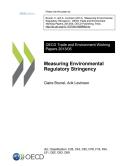This report identifies the broad range of policy measures required by national or federal governments to promote and facilitate the greening of industries. It has been prepared as part of the United Nations Industrial Development Organization (UNIDO) Green Industry initiative, which focuses on ways that developing countries can green their industries and accelerate growth in their environmental goods and services sector. One of the key objectives of the initiative is assessing the effectiveness of governments in developing countries in supporting the greening of their industries through national strategies, policies and integrated governance structures.

This volume examines the experiences of 21 developed and developing countries in adjusting their training provision to meet the new demands of a greener economy. Analysts started by identifying the drivers of transformation to a greener economy – changes in the physical environment itself and changes induced by government regulations, more efficient technologies and changes in consumer demand. Then they assessed the effect of these changes on employment, identifying areas of job growth and of job loss
Only then could researchers start to understand how skill requirements are changing and are expected to change in the future, and to examine how well national training systems are anticipating and responding to these new needs. Their analysis shows that skills development is critical to unlocking the employment potential of green growth, yet skills shortages are becoming an obstacle in realising this potential. The report recommends that countries devise strategies based on well-informed policy decisions, social dialogue, and coordination among ministries and between employers and training providers.
China’s economy continues to grow rapidly with corresponding increases in both energy consumption and environmental pollution. Renewable energy is a key part of China’s response to this challenge. Currently, the costs of measures to facilitate the large-scale deployment of renewable energy are primarily met through an electricity surcharge—effectively a tax on electricity consumption. However, concerns have been raised that continuing to rely on the surcharge alone places a disproportionate burden on electricity consumers. In response, the International Institute for Sustainable Development (IISD) and the China National Renewable Energy Centre (CNREC) identified the need for further debate on how best to fund renewable energy and reduce environmental pollution, leading to the establishment of a research project to examine the international experience of similar schemes and their relevance to China.
The publication includes case studies from Australia, Canada, Denmark, Germany, India, Japan, the United Kingdom, and the United States.
The world is increasingly faced with the challenges stemming from the need to sustain an expanding global population while simultaneously addressing the environmental pressures that could threaten our ability to accomplish this. Green growth has emerged as a strategy to balance the historically divergent priorities of achieving economic growth and social development without putting at risk the environmental systems and natural capital we rely so heavily upon. This approach emphasizes the environmental and economic gains achieved by reducing inefficiencies in the management of resources and the stimulation of new sources of activity through innovation and green market growth.
